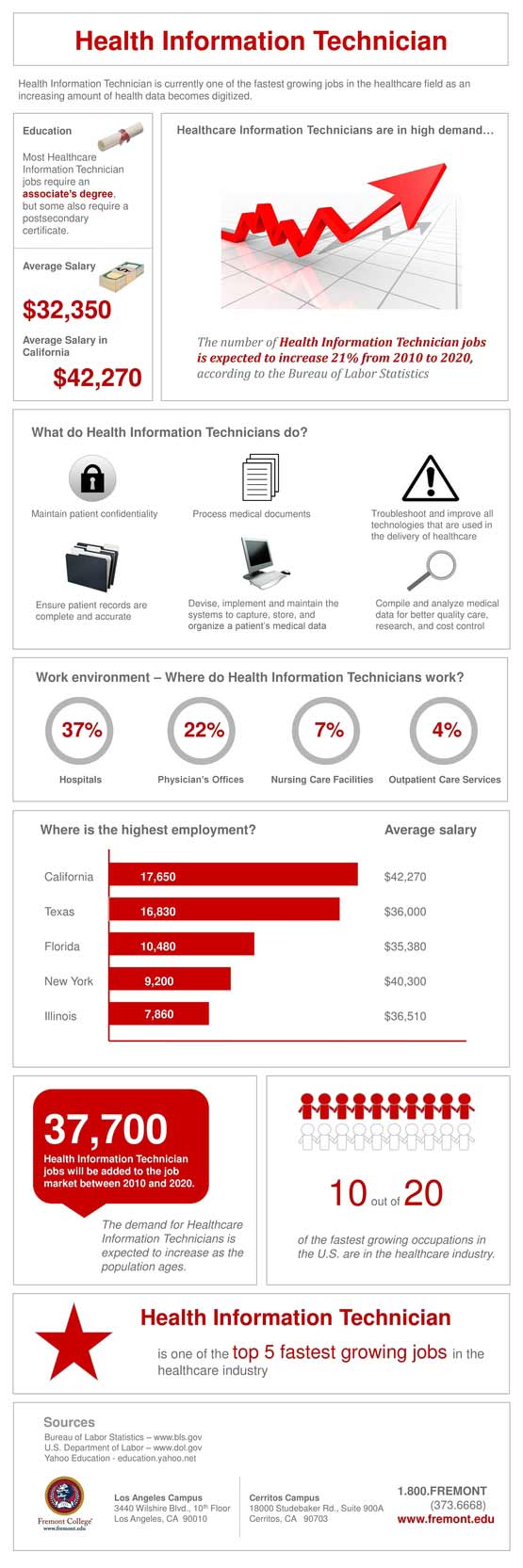Health Information Technician Infographic
Health Information Technician: A Rapidly-Expanding Field
The healthcare industry is growing at a rapid pace as a result of the recent changes to the healthcare system. Due to the increased need for skilled healthcare workers, there is no better time to earn a Healthcare Information Technology degree and prepare for a career in one of the fastest growing industries in the U.S.
Check out the Health Information Technician infographic below to learn more about this field.

Health Information Technician: A Rapidly-Expanding Field
Health information technicians are custodians of the medical record in the health care system. Up until recent years, medical records were paper-based documents that contained a patient’s health information and history from birth to death. Slowly, the industry is moving away from paper-based documents to computer-based records. This is done by using electronic record systems. By using these systems, health care providers can improve the quality and efficiency of the services they render for patients.
Health information must be accurately completed and maintained, as well as thoroughly protected from inappropriate disclosure. It also needs to be available when it is needed to effectively care for a patient. These records are also a vital component for research, statistical data analyses and coding for expense reimbursement by insurance providers.
Where Do Health Information Technicians Work?
The workplace environment for a health information technician is typically a hospital setting, but can also include physicians’ offices, pharmaceutical companies, nursing homes, government health agencies, insurance companies, cancer registries, attorneys, and software vendors.
Common duties a health information technician performs include:
- Using computer applications to perform record processing functions like assembly and analysis of the patient data
- Ensure patient data is complete and accurate
- Scanning and indexing paper documents for organizations still in transition to an electronic record
In addition, health information technicians work closely with professional staff like physicians to ensure that the documentation gathered is signed and completed according to the organization’s bylaws and legal record requirements. Many health information technicians specialize in the coding and abstracting of the patient data. This critical role directly impacts an organization’s reimbursement and the accuracy of the data used in research and analysis.
What Educational Background is Needed to Be a Health Information Technician?
If you are interested in a career as a health information technician, it is suggested that you start as early as possible with classes and training. High school students should try to take classes in business, computers, math, health and biology. Once you have graduated, you should complete a two-year Associate degree program. It is important to choose a health information management (HIM) program that is accredited by the Commission on Accreditation for Health Informatics and Information Management (CAHIIM).
Once you have completed the academic requirements at the associate level of a HIM program accredited by CAHIIM, you are eligible to sit for the RHIT certification exam administered by the American Health Information Management Association (AHIMA). When you have successfully passed this exam, you can then utilize the RHIT designated credentials. Obtaining certification credentials will open many doors for you, since many employers look for this designation during the hiring process. Health information technicians can also receive on-the-job training.
What Is the Job Outlook for Health Information Technicians?
According to the U.S. Bureau of Labor Statistics, health information technicians make an annual average salary of $40,430. Eighty percent earn between $24,190 and $61,400. If you possess good coding abilities and/or have experience with electronic health records experience, you will likely earn a higher income. Obtaining a bachelor’s or master’s degree in the field can also boost both your marketability, earnings, and advancement opportunities.
How to Become a Health Information Technician
The Healthcare Information Technology degree program at Fremont University prepares students to play vital roles in the healthcare delivery system. The program takes just 15 months to complete, allowing students to earn an associate’s degree in Healthcare Information Technology and begin working in the field in a little over one year. Don’t wait any longer to start preparing for an exciting and rewarding career – contact us today to learn more about the HIT program and how you can start on the path to career success.

